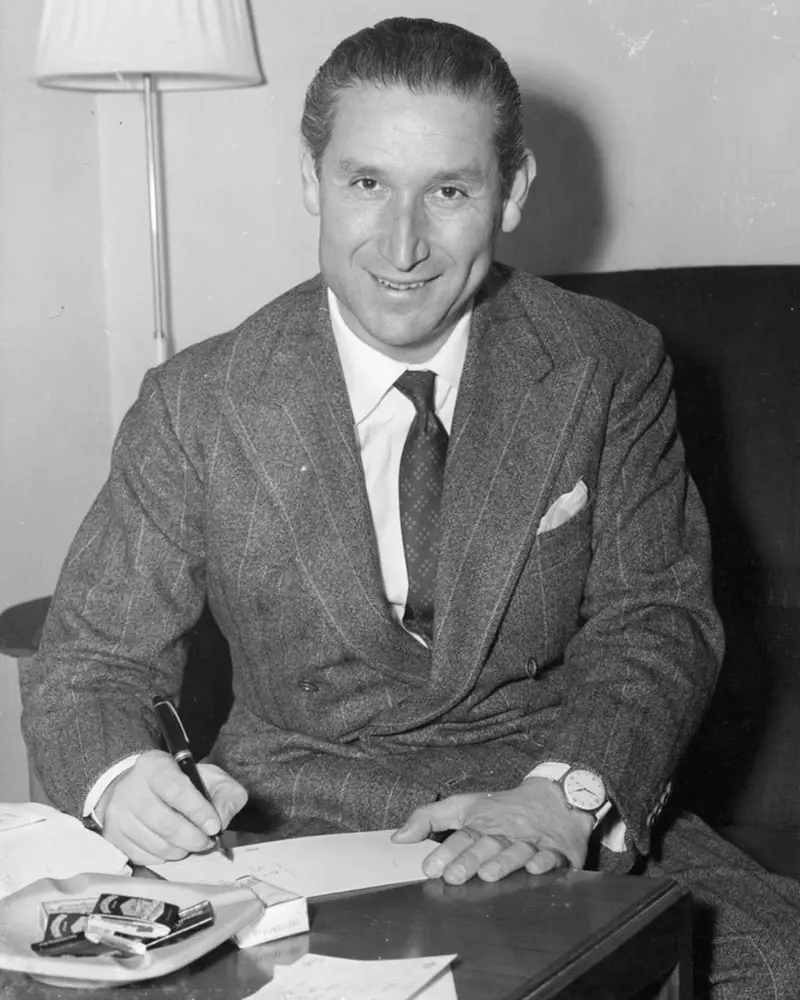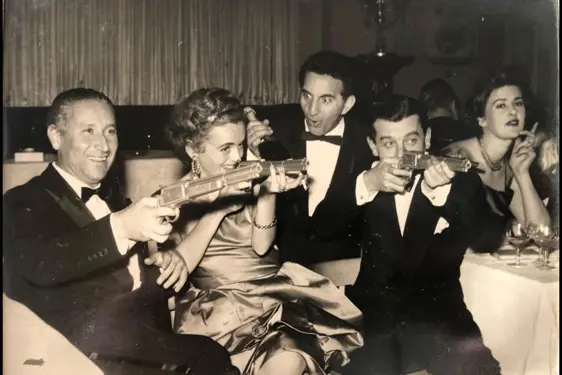“SCANDALO INTERNAZIONALE A POSITANO” shouted the headline of an article published in Italian gossip and glamour magazine Gente in the summer of 1959. Below this hook came a subheading that provided curious readers with more details: “An English army major accuses the mayor of Positano of ‘casting a spell’ over his wife, the beautiful Annemarie”.
SCANDALO A POSITANO!
30.04.2021 LE SIRENUSE
The mayor in question was Paolo Sersale, who eight years previously had presided over the conversion of his family’s seaside villa in Positano into a small, elegant hotel called Le Sirenuse. In 1959, Paolo was in his fifteenth consecutive year as sindaco of the little Amalfi Coast town. His first term had begun in 1944, towards the end of the war, when the scion of a noble Neapolitan family was just 24 going on 25.
The Gente article claims that Paolo met Anne Mary Dent-Brocklehurst when he travelled to London in 1954 for a series of meetings and presentations designed to spread the word about Positano, which was then a decidedly niche ‘insider’ destination. But Paolo and Anne’s daughter Marina Sersale is sure that the meeting happened in Positano itself, when Anne came to the resort town with her then husband, British army officer Richard Guy Carne Rasch, who bore an introduction to Paolo and a book one of the mayor’s London friends had wanted to send him. Later to be made a baronet after the death of his uncle, Rasch was the son of a brigadier who served as gentleman usher to both George VI and Elizabeth II. A friendship sprung up between the Italian bachelor and the English couple who, on Paolo’s invitation, spent their summer holidays at Le Sirenuse for at least two successive years.

However, Anne later began to travel to Positano alone, sometimes with her sisters Katie and Rosie and sometimes with another married friend, while her husband was detained in London by his army duties. By her third prolonged solo stay in 1959, rumours were rife: it was Paolo, some said, rather than Positano, that was the main attraction for the woman Gente magazine referred to as “a slim blonde thirty-five-year-old, of average height, with deep blue eyes… the classic example of an English beauty”.
The article written by the gossip sheet’s intrepid reporter Marcello Zanfagna makes for intriguing and often amusing reading today. Partly this is because attitudes have changed so radically since those years, when prudishness was the flipside of lurid curiosity (Fellini would hold these double standards up to the light in his 1961 film La dolce vita, which was in development at just this time). But mostly it has to do with the reaction Zanfagna received from ordinary positanesi who, to a man, and woman, seem to have leapt to the defence of their mayor and his English lady friend.
The Naples-based reporter admits as much in his opening sentence: “Positano is united in defending its mayor, marquis Paolo Sersale, from the accusation of ‘collusion in adultery’ formulated against him by a British court, to which Royal Guards major Richard Guy Carne Rasch appealed two weeks ago in order to secure a divorce from his wife, Annemarie Mary Brocklerhust”.
Poor signor Zanfagna – he never did manage to spell Anne’s surname correctly, and the reception he received while trying to elicit tasty bits of gossip from the good people of Positano was frosty, to say the least. “We encountered no little difficulty”, he wrote, with perhaps surprising candour, “in getting close to la signora Annemarie, let alone taking a photo of her. The fishermen and the souvenir sellers invited us in no uncertain terms to go home and stop bothering ‘Mary’, as they affectionately called her. “Here in Positano”, said an old fisherman nicknamed “O’ Schiavone”, “everyone minds their own business and nobody has the right to poke their nose into other people’s affairs”.
After her divorce was secured, Anne and Paolo married, and spent thirty years together before her premature death in 1989 at the age of 64. Two daughters were born to the couple: Giulia, in 1960, and Marina, in 1962. Today, Giuila oversees Le Sirenuse’s verdant indoor and outdoor plants, while Marina and her husband Sebastián Alvarez Murena are founder-managers of one of the resort’s partner brands, the fragrance and bodycare line Eau d’Italie. Giulia relates that some of her parents’ happiest moments were spent in their Umbrian country house, where Paolo made what she calls “a simply disgusting wine called Il Furioso, named after the small river falls close by”, and Anne looked after her beloved Alsatian dogs and tended to the garden – Giulia credits her with inspiring her own love of plants and nature.

View
The story also has a surprising twist. After the divorce, Anne’s first husband Richard ‘Dickie’ Rasch married one of her best friends, Fiona Salmon, who had been her constant companion on her frequent Positano trips and had even had her own brief fling with one of the town’s hoteliers. Paolo and Dickie were reconciled, and the two couples saw much of each other during Paolo and Anne’s visits to England (the photo reproduced above shows them all having fun at London’s swanky Embassy Club: from left to right we see Paolo, Anne, a club entertainer, Dickie and Fiona). Paolo was fond of Anne’s two children with Dickie, Simon and Leila, who would spend their summer holidays in Italy and developed a deep bond with their half-sisters Giulia and Marina. Paolo even arranged for a Sardinian donkey called Mia to be sent over to his acquired stepson and stepdaughter’s home in Wiltshire. Soon adapting herself to the English climate, Mia would live forty long years – a ripe old age for a donkey.
Actress Liz Taylor – herself a habituée of Positano in the dolce vita years – once said that “you find out who your real friends are when you’re involved in a scandal”. Paolo and his bride-to-be must have thought the same thing in the summer of 1959, as they were being harried by the gossip press. Not for the first time in their long history, the inhabitants of a remote village on the Amalfi Coast proved themselves to be true, loyal friends to those that they liked, respected and trusted. “O’ Schiavone” the fisherman may not have been a fancy journalist from the big city – but he could teach the latter a few lessons in personal ethics.
Le Sirenuse Newsletter
Stay up to date
Sign up to our newsletter for regular updates on Amalfi Coast stories, events, recipes and glorious sunsets




